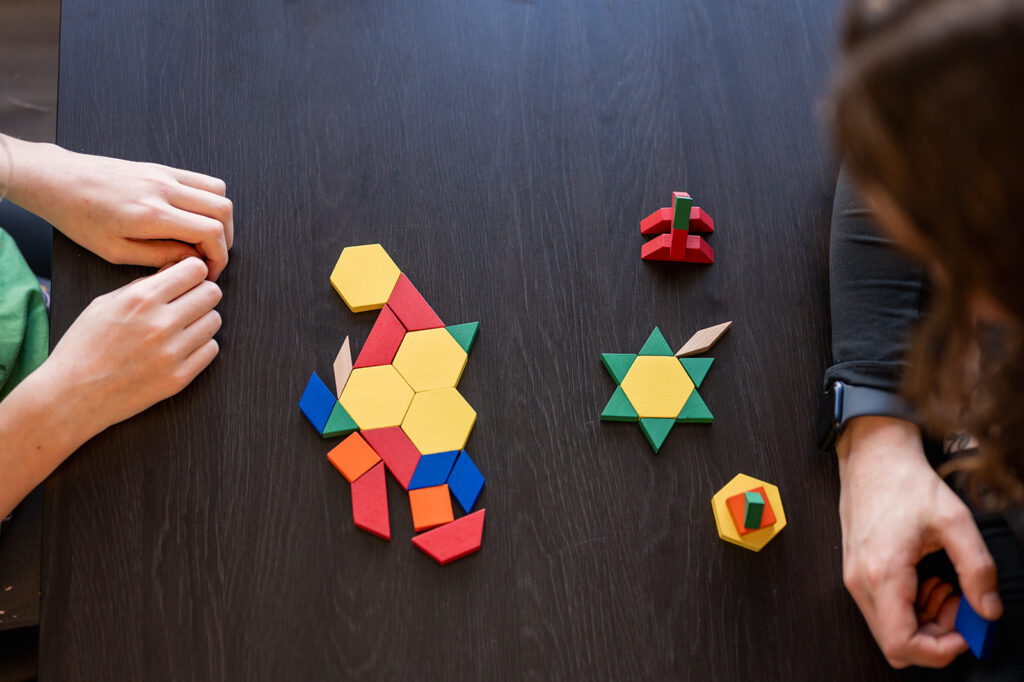Seeking additional services for your child shouldn’t be complicated. As a parent or caregiver, advocating for your child to receive the best possible care for a high quality of life is paramount. When looking for occupational therapy (OT) or physical therapy (PT) help, the first step typically involves booking an assessment.

So, what exactly is a PT or OT assessment?
A pediatric assessment in PT or OT is a comprehensive evaluation process designed to assess your child’s physical, developmental, sensory, or functional abilities. The primary goal of the assessment is to identify your child’s strengths, challenges, and therapy needs accurately. This is essential for creating an individualized treatment plan tailored to address your child’s specific needs and promote their development and independence.
During the assessment, your therapist will engage with your child in various activities, tasks, and observations to gather valuable information about their abilities and challenges. This may include tasks to assess fine motor skills, gross motor skills, sensory processing, balance, coordination, strength, and functional abilities. Additionally, your therapist will ask questions about your child’s medical history, developmental milestones, and any concerns you have. They may also refer to any relevant documentation you provide, such as previous medical records, evaluations, or reports from other healthcare providers.

Based on the assessment findings, your therapist will develop an individualized treatment plan tailored to your child’s specific needs, goals, and abilities. This plan may include therapeutic activities, exercises, interventions, and strategies aimed at addressing your child’s challenges and promoting their development and independence.
A PT or OT assessment is a crucial first step in the journey to providing your child with the support they need to thrive. It’s an opportunity for your therapist to gather essential information, collaborate with you to understand your child’s needs, and develop a plan to help them reach their full potential. By taking this important step, you’re taking proactive measures to ensure that your child receives the best possible care for their overall well-being and quality of life.
Preparing for your child’s initial assessment can significantly contribute to the effectiveness of the session. By taking a few simple steps beforehand, you can ensure that your child feels comfortable, engaged, and ready to participate in the assessment process.
How to Set Up Your Kiddo for Success at Their Initial Assessment:
- Ensure Intake Form is Filled Out: Before the assessment, make sure to complete any necessary intake forms provided by the therapy center. This will help the therapist gather important information about your child’s medical history, developmental milestones, and specific concerns.
- Dressed Properly and Fed: Ensure your child is dressed comfortably in clothing that allows for ease of movement, especially if the assessment involves physical activities. Additionally, make sure your child has had a meal or snack prior to the appointment to help them stay focused and energized.
- Bring Any Questions You May Have: Take some time to jot down any questions or concerns you have about your child’s development or therapy goals. Bringing these questions to the assessment will allow you to discuss them with the therapist and gain valuable insights into your child’s needs.
- Parent/Guardian Present: It’s important for a parent or guardian to accompany the child to the assessment. Your presence provides support and allows you to actively participate in the discussion about your child’s needs and goals.
- Bring Any Relevant Documentation: If your child has received any previous evaluations, Individualized Education Plans (IEPs), or psychological assessments, bring copies of these documents to the assessment. This information can provide valuable insights into your child’s strengths, challenges, and previous interventions.

Frequently Asked Questions
Q: What is a pediatric assessment in PT/OT, and why is it necessary for my child?
A: A pediatric assessment in PT or OT involves evaluating a child’s physical, developmental, sensory, or functional abilities to identify strengths, challenges, and therapy needs. It is necessary to create an individualized treatment plan to address your child’s specific needs and promote their development and independence.
Q: How long does a pediatric assessment typically last?
A: The duration of a pediatric assessment can vary depending on the child’s age, condition, and the scope of assessment. On average, it may last anywhere from 60 to 90 minutes.
Q: What can I expect during my child’s pediatric assessment with a PT/OT?
A: During the assessment, the therapist will engage your child in various activities, tasks, and observations to assess their motor skills, sensory processing, functional abilities, and overall development. They may also ask questions about your child’s medical history, developmental milestones, and any concerns you have.
Q: What type of information or documentation should I bring to the assessment?
A: It’s helpful to bring any relevant medical records, previous evaluations, Individualized Education Plans (IEPs), psychological assessments, or reports from other healthcare providers. This information can provide valuable insights into your child’s strengths, challenges, and previous interventions.
Q: How will the therapist determine my child’s individualized treatment plan based on the assessment findings?
A: Based on the assessment findings, the therapist will develop an individualized treatment plan tailored to your child’s specific needs, goals, and abilities. This plan may include therapeutic activities, exercises, interventions, and strategies to address your child’s challenges and promote their development.
Q: Can I be present during my child’s assessment, and will I have the opportunity to ask questions?
A: Yes, parents or caregivers are encouraged to be present during their child’s assessment. You will have the opportunity to observe the assessment, provide valuable input about your child, and ask any questions you may have about the assessment process or treatment recommendations.
Q: What kinds of activities or exercises might be included in the assessment?
A: Activities and exercises in the assessment may vary depending on your child’s age, condition, and therapy goals. They may include tasks to assess fine motor skills, gross motor skills, sensory processing, balance, coordination, strength, and functional abilities.
Q: How will the therapist communicate the assessment results and recommendations for therapy?
A: The therapist will discuss the assessment findings, therapy goals, and treatment recommendations with you after the assessment. They will provide clear explanations, answer any questions you have, and collaborate with you to develop a plan that meets your child’s needs.
Q: How often will my child need to attend therapy sessions following the assessment?
A: The frequency of therapy sessions will depend on your child’s individual needs, therapy goals, and therapist’s recommendations. Initially, sessions may be scheduled weekly or bi-weekly, with adjustments made based on your child’s progress.
Q: What are the potential benefits of pediatric PT/OT assessments for my child’s overall development and well-being?
A: Pediatric PT/OT assessments can help identify areas of strength and areas needing improvement in your child’s development. Through targeted interventions and therapy, these assessments can promote your child’s physical, cognitive, social, and emotional development, leading to improved functional abilities, independence, and overall well-being.






